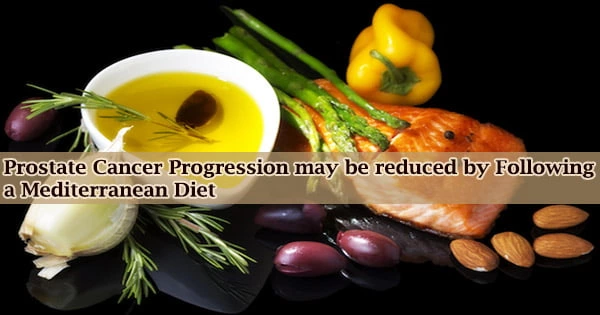Researchers from the University of Texas MD Anderson Cancer Center found that men with localized prostate cancer who reported a baseline dietary pattern that more closely followed the key principles of a Mediterranean-style diet fared better over the course of their disease in a study to examine the Mediterranean diet in relation to prostate cancer progression in men on active surveillance.
“Men with prostate cancer are motivated to find a way to impact the advancement of their disease and improve their quality of life,” said Justin Gregg, M.D., assistant professor of Urology and lead author of the study, published today in Cancer.
“A Mediterranean diet is non-invasive, good for overall health and, as shown by this study, has the potential to effect the progression of their cancer.”
According to U.S. News & World Report, the Mediterranean Diet was the Best Overall Diet in 2022, 2021, 2020, 2019, and 2018.
According to U.S. News & World Report, the Mediterranean Diet was ranked #1 Best Plant-Based Diet, Best Heart-Healthy Diet, Best Diabetes Diet, Best Diet for Healthy Eating, and Easiest Diet to Follow in 2022.
Men who ate more fruits, vegetables, legumes, cereals, and fish had a lower risk of their prostate cancer growing or progressing to the point where many would consider active treatment after adjusting for factors known to increase the risk of cancer getting worse over time, such as age, PSA, and tumor volume.
Prostate cancer is a type of cancer that affects the prostate gland. Prostate cancer is one of the most common types of cancer. Males have a small walnut-shaped gland called the prostate that generates seminal fluid, which nourishes and transports sperm.
The effect of diabetes and statin use was also investigated, and the researchers discovered a similar risk reduction in these patient groups. The Mediterranean Diet is now more popular than ever, with fresh research confirming its benefits every month and chefs and home cooks alike embracing Mediterranean products and flavors.
The Mediterranean diet’s effect was more significant in African American individuals and others who self-identified as non-white, according to the study, which had the biggest proportion of white participants.
The Mediterranean diet consistently has been linked to a lower risk of cancer, cardiovascular disease, and mortality. This study in men with early-stage prostate cancer gets us another step closer to providing evidence-based dietary recommendations to optimize outcomes in cancer patients, who along with their families, have many questions in this area.
Carrie Daniel-MacDougall
These findings are relevant since African American males have a greater likelihood of prostate cancer diagnosis, as well as a higher risk of prostate cancer death and disease progression.
“The Mediterranean diet consistently has been linked to lower risk of cancer, cardiovascular disease and mortality. This study in men with early stage prostate cancer gets us another step closer to providing evidence-based dietary recommendations to optimize outcomes in cancer patients, who along with their families, have many questions in this area,” said Carrie Daniel-MacDougall, Ph.D., associate professor of Epidemiology and senior author of the study.
Prostate cancer is the second most frequent cancer in men in the United States, after skin cancer. Because the majority of cases are low-risk, restricted to the prostate, and have acceptable outcomes, many men opt for active surveillance by their doctor rather than early treatment.
Many prostate cancers are slow-growing and limited to the prostate gland, where they are unlikely to cause substantial harm. While some varieties of prostate cancer are slow-growing and require little or no therapy, others are aggressive and spread quickly.
Because prostate cancer treatments can result in changes in quality of life and reductions in urinary and sexual function, researchers are looking for modifiable factors in men who are on active surveillance. The study monitored 410 men with Gleason grade 1 or 2 localized prostate cancer who were on an active surveillance program.
At the start of the trial, all patients had a confirmatory biopsy, and they were examined every six months with a clinical exam and laboratory tests for serum antigen PSA and testosterone.
82.9 percent of trial participants were Caucasian, 8.1 percent were Black, and 9% were other or unknown. The men were on average 64 years old, 15% were diabetic, and 44% took statins.
Each participant’s Mediterranean diet score was determined across 9 energy-adjusted food groups after they completed a 170-item baseline food frequency questionnaire. The participants were then separated into three groups based on their diet adherence: high, medium, and poor.
Researchers discovered a significant link between a high baseline diet score and a lower chance of cancer grade advancement after adjusting for age and clinical factors. Researchers discovered a >10 percent decreased risk of progression for every one-point increase in the Mediterranean diet score. 76 males had their cancer progress after a median follow-up of 36 months.
The small number of incidents in these individuals with primarily low-risk illness who were tracked at MD Anderson hampered the study. Future studies are needed to establish if the same results are shown in bigger and more diverse patient groups, as well as individuals with higher-risk prostate cancer.
“Our findings suggest that consistently following a diet rich in plant foods, fish and a healthy balance of monounsaturated fats may be beneficial for men diagnosed with early-stage prostate cancer,” Gregg said. “We are hopeful that these results, paired with additional research and future validation, will encourage patients to adapt a healthy lifestyle.”
The Department of Defense Prostate Cancer Research Program Early Career Award (W81XWH-18-1-0193), a National Cancer Institute Cancer Center Support Grant to MD Anderson (CCSG 5P30 CA016672-37) and a Research Training Award supported this research for Cancer Prevention Post-Graduate Training Program in Integrative Epidemiology from the Cancer Prevention & Research Institute of Texas (RP160097).





